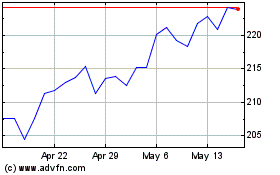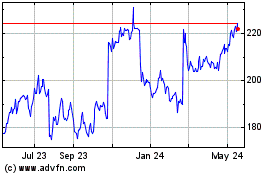Organizations Are Least Prepared for Crises that Pose the Greatest Risk, According to FTI Consulting-Sponsored General Counsel Survey
October 15 2024 - 3:00AM

Organizations are least prepared for crises that pose the greatest
risk to their business and are slow to implement lessons that would
improve their ability to respond to future events, according to a
recent study sponsored by FTI Consulting (NYSE: FCN).
Economist Impact’s survey on the role of the general counsel in
a crisis canvassed 600 primary legal decision makers across North
America; Europe, the Middle East and Africa (“EMEA”); and Asia
Pacific. When asked to select crises that pose the greatest risks
to their organizations, reputational or operational crisis events
were cited among the top three out of 12 types of crises by nearly
30% of the surveyed GCs. Reputational or operational crisis events
are also among the top three crises that their organizations are
least prepared to manage, according to about 30% of GCs.
More than two-thirds of organizations surveyed did not
incorporate lessons from past crises into trainings and crisis
drills. This gap will leave many organizations vulnerable to the
impacts of a crisis or black swan event, particularly against a
backdrop of a series of disruptive external events, such as cyber
attacks and data breaches, macroeconomic shocks, political
disruption and geopolitical conflicts.
“The reality today is that the number and variety of major
corporate events and crises that companies can face has soared,”
said Steven H. Gunby, President and Chief Executive Officer of FTI
Consulting. “Example after example have shown that whether the
company handles the crisis well or not, can be the single largest
determinant of its market value over a five-year period, as well as
its reputation. As a result, the general counsel is increasingly
not only being asked to play the role of the chief legal officer
but is also very frequently being asked to play the role of ‘chief
line manager in charge of the crisis or event.’ Everyone is looking
to them to lead.”
With the increasing frequency, complexity and unpredictability
of crisis events over the past five years, about 60% of all GCs
surveyed reported being more involved in their organization’s
crisis management strategy. However, their involvement is not
uniform across the globe. A higher share of GCs in North America
(64%) and EMEA (60%) are more involved in business continuity and
financial contingency planning compared to their peers in Asia
Pacific (42%). Similarly, close to twice as many GCs in North
America (63%) compared to Asia Pacific (33%) are more involved in
monitoring and analyzing the impact of early-warning signs beyond
the legal remit that affect the organization’s reputation or
brand.
Artificial intelligence (“AI”) or machine learning (“ML”)-based
modeling can be particularly powerful in delivering comprehensive,
granular and precise crisis impact assessments. Yet, more than half
of surveyed organizations are not deploying AI or ML-powered
modeling for crisis management. One possible reason is a gap in
skills needed to run impact analyses and utilize technology
solutions, which was cited by three in 10 GCs as one of the top
five challenges preventing their organizations from being more
prepared for crisis events.
Close to 70% of surveyed organizations lack an identified
ad-hoc, cross-functional crisis response team or a pre-selected
list of external crisis response advisors that can assemble easily
when a crisis arises. When asked to select the top priorities of
their legal department to better prepare for the next crisis based
on learnings from past events, 42% of GCs cited the creation of a
well-rounded crisis response team among their top three priorities.
Increased spend on crisis preparedness activities, tools,
technology enhancements, external advisors or vendors (40%) and
adopting more advanced technologies for crisis monitoring and
impact analysis (33%) were the other two top priorities.
Lars Faeste, EMEA Chairman of FTI Consulting, added, “The
stakes have never been higher when it comes to the navigation of
crises and black swan events. The fact that this report reveals
that a significant majority of organizations are not incorporating
lessons from past crises into their contingency planning is a
concern. Leadership teams often recognize what needs to be done but
are yet to take timely and decisive action. Others lack the tools
and resources that provide a comprehensive understanding of
emerging risks. General counsel play a vital and ongoing role in
helping their organization close these crisis preparedness gaps,
enabling them to become more informed, agile and effective in
managing future events.”
Additional key survey findings include:
- More than two-thirds of GCs in financial services, banking and
insurance have expanded the scope of their early-warning monitoring
and analysis exercises across strategic partners beyond legal,
compared with less than half across all surveyed
organizations.
- GCs in manufacturing are more involved in managing crises and
their impacts (72%) than their peers in financial services, banking
and insurance (68%), IT/technology, media and telecommunications
(64%), energy, oil and gas (63%), retail (62%) and healthcare and
life sciences (54%).
- Nearly 40% of respondents said they did not have a contingency
plan in place for a cyber attack or a supply-chain failure.
For additional findings, view the full report: Turbulent waters,
trusted anchors: The general counsel’s evolving role in navigating
crises.
Demographics and MethodologyFTI Consulting
sponsored the research for Turbulent waters, trusted anchors: The
general counsel’s evolving role in navigating crises, which was
conducted by Economist Impact. This survey-based study explores the
perspectives of primary legal decision-makers on the nature of the
crisis landscape today, their organization’s crisis preparedness,
and how their roles have evolved in managing these events.
The survey field work was conducted online and by telephone
between April to May 2024. It covered a total of 600 primary legal
decision-makers across North America (25%); Europe, Middle East and
Africa (50%); and Asia Pacific (25%). All respondents worked in
organizations with annual revenues of more than $1 billion.
About FTI ConsultingFTI Consulting, Inc. is a
global business advisory firm dedicated to helping organizations
manage change, mitigate risk and resolve disputes: financial,
legal, operational, political & regulatory, reputational and
transactional. With more than 8,000 employees located in 33
countries and territories, FTI Consulting professionals work
closely with clients to anticipate, illuminate and overcome complex
business challenges and make the most of opportunities. The Company
generated $3.49 billion in revenues during fiscal year 2023. In
certain jurisdictions, FTI Consulting’s services are provided
through distinct legal entities that are separately capitalized and
independently managed. More information can be found at
www.fticonsulting.com.
FTI Consulting, Inc. 555 12th Street
NWWashington, DC 20004 +1.202.312.9100
Investor Contact:Mollie
Hawkes+1.617.747.1791mollie.hawkes@fticonsulting.com
Media Contact:Matthew
Bashalany+1.617.897.1545matthew.bashalany@fticonsulting.com
FTI Consulting (NYSE:FCN)
Historical Stock Chart
From Dec 2024 to Jan 2025

FTI Consulting (NYSE:FCN)
Historical Stock Chart
From Jan 2024 to Jan 2025
